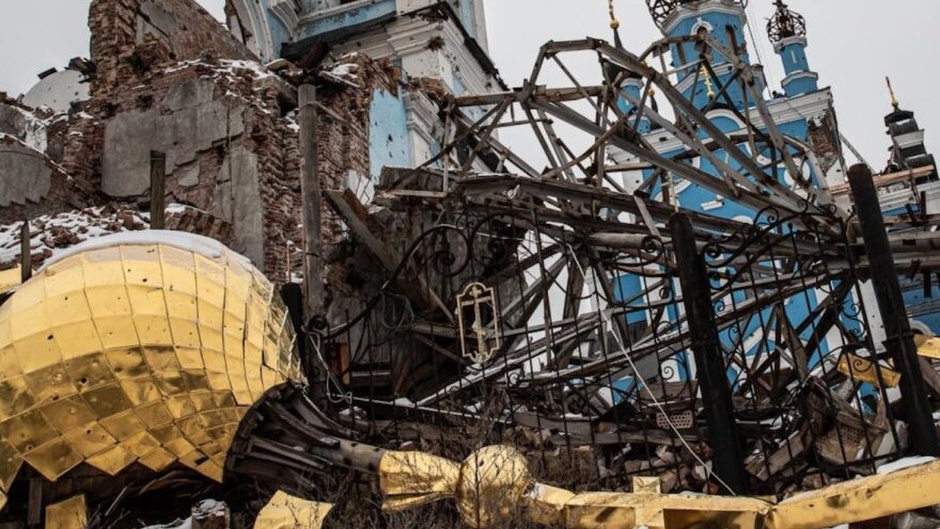Russian propaganda that Vladimir Putin is ‘protecting Christianity’ against Satanism flies in the face of reliable reports from numerous sources of the ruthless persecution of Christians.
 Photo: Wolodymir Kutsenko, WCC.
Photo: Wolodymir Kutsenko, WCC.
Russian propaganda that Vladimir Putin is ‘protecting Christianity’ against Satanism and neo-Nazism flies in the face of reliable reports from numerous sources of the brutal and ruthless persecution of Christians in the occupied Ukrainian territories.
To justify his imminent ‘special operation’ against Ukraine, Putin said in February 2022: “The overthrow of faith and traditional values and the suppression of freedom (in Ukraine!!) are resembling a ‘religion in reverse’ — pure Satanism”.
Some western politicians, from Republican congresswoman Greene to Hungarian prime minister Orban, openly support Putin’s professed crusade to ‘save Christianity’. Their wilful blindness is exposed by countless stories of church buildings being systematically destroyed or severely damage; worse still, of sadistic torture, rape, imprisonment, abduction, murder and disappearance of church leaders – including pastors, priests, bishops and deacons.
Even before the full-scale Russian invasion, systematic religious freedom violations were being conducted in the Luhansk People’s Republic (LNR), in Ukraine’s Luhansk region, which declared independence in May 2014 after the Crimea occupation. A law passed in 2018 permitted authorities “to discriminate against any and all non-Orthodox religious communities”.
It was a harbinger of things to come. Since the invasion, more than 600 religious buildings have been reported damaged or destroyed by targeted Russian missiles, suicide drones, artillery strikes, and other violence. The Ukrainian Pentecostal Church, Evangelical and Baptist churches, and the Seventh-day Adventists have all been targeted as ‘extremists’. Over one hundred Kingdom Halls of the Jehovah’s Witnesses have been damaged. All Protestant and non-Orthodox churches were banned soon after the conquest of Mariupol.
United Nations Special Rapporteurs have stated in writing to the Russian authorities their ‘serious concern for the alleged enforced disappearances and torture… of clergy in the occupied territories’. Russian authorities have not answered.
Hidden roots
This week, in an online prayer session from Ukraine with YWAM colleagues, our attention was drawn to the persecuted churches in the occupied territories for prayer. As we asked God how to pray for the persecuted church, I recalled an article I recently had read about an Australian agronomist encouraging reforestation in the Sahel region in Africa. With local farmers, he has reforested 50,000 square kilometres of forest in 40 years – without planting a single tree.
The agronomist realised that in most of the drought-prone areas of the world, almost invisible underground forests were still alive. Hidden roots and seeds of former trees or existing bushes remained under the ground. If these roots were pruned, protected and cared for systematically, they would eventually grow into trees. The trees would in turn help agriculture and improve people’s livelihoods. They brought hope.
Local churches also bring hope, healing, reconciliation and transform people’s lives. Even as the occupiers presently suppress religious freedom and bury current forms of worship, we prayed for hidden seeds to sprout again and bring new life.
Which in turn triggered another association.
Answered prayer
During the Thirty Years’ War, much of Central Europe was ravaged by the drawn-out struggle between the forces of the Reformation and the Counter-Reformation. At the Battle of White Mountain just outside of Prague in 1620, the Catholic House of Hapsburg repulsed a revolt by the Protestant nobles. Bohemia and Moravia, overlapping today’s Czech Republic, became firmly under Catholic control. The Brethren had to recant, go underground, leave the country… or be killed.
A young teacher named Comenius, 26 years old when war broke out in 1618, was a member of the Unitas Fratrum (the United Brethren), the church formed by followers of Jan Hus. On several occasions, Comenius had had to flee from hostile soldiers. He had lost his wife and child, and all his written manuscripts. In 1628, with the Brethren now scattered by persecution, Comenius found himself shepherding a small straggling band of refugees across the mountainous border to safety in Poland. As they stopped to take one last look back at their homeland, Comenius prayed for God to preserve a ‘hidden seed’ in that land that would one day bring forth fruit.
Comenius and his band of refugees settled in Lissa (Lezno), Poland, where he was consecrated as bishop of the Unitas Fratrum. He remarried and continued developing his educational ideas. He would eventually be recognised as ‘the father of modern education’. Yet once more war forced Comenius to flee from Lissa. Eventually he found refuge in Amsterdam, where he died in 1670.
His prayer for the ‘hidden seed’ however was answered some fifty years after his death. More refugees from Moravia and Bohemia found their way across the border into Saxony, in modern Germany. There under the leadership of Count von Zinzendorf they grew into the missionary community of Herrnhut, which in 1732 sent out missionaries at the very start of the modern Protestant missionary movement.
“Lord, preserve hidden seeds in the occupied territories of Ukraine that one day will bring forth fruit!”

Las opiniones vertidas por nuestros colaboradores se realizan a nivel personal, pudiendo coincidir o no con la postura de la dirección de Protestante Digital.
Si quieres comentar o